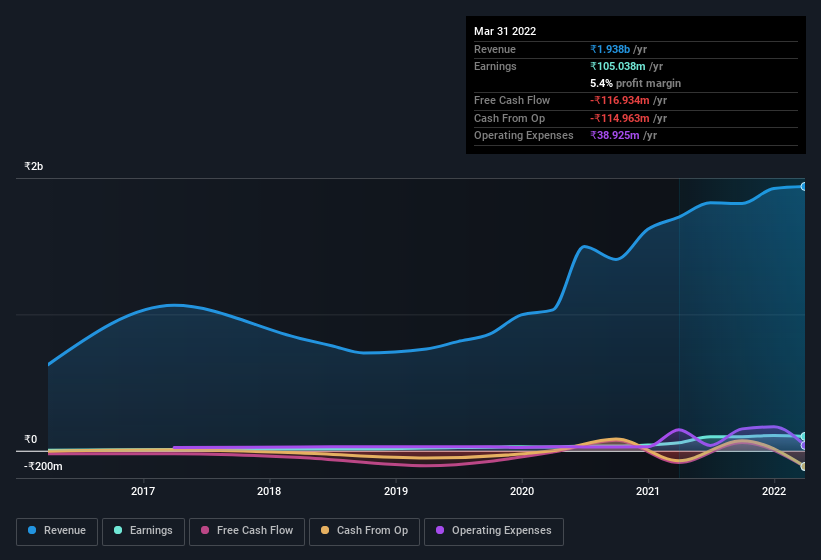We Think That There Are Issues Underlying Bombay Super Hybrid Seeds' (NSE:BSHSL) Earnings

Bombay Super Hybrid Seeds Limited (NSE:BSHSL) announced strong profits, but the stock was stagnant. We did some digging, and we found some concerning factors in the details.
View our latest analysis for Bombay Super Hybrid Seeds

Examining Cashflow Against Bombay Super Hybrid Seeds' Earnings
In high finance, the key ratio used to measure how well a company converts reported profits into free cash flow (FCF) is the accrual ratio (from cashflow). In plain english, this ratio subtracts FCF from net profit, and divides that number by the company's average operating assets over that period. This ratio tells us how much of a company's profit is not backed by free cashflow.
Therefore, it's actually considered a good thing when a company has a negative accrual ratio, but a bad thing if its accrual ratio is positive. While it's not a problem to have a positive accrual ratio, indicating a certain level of non-cash profits, a high accrual ratio is arguably a bad thing, because it indicates paper profits are not matched by cash flow. That's because some academic studies have suggested that high accruals ratios tend to lead to lower profit or less profit growth.
Over the twelve months to March 2022, Bombay Super Hybrid Seeds recorded an accrual ratio of 0.33. We can therefore deduce that its free cash flow fell well short of covering its statutory profit, suggesting we might want to think twice before putting a lot of weight on the latter. Even though it reported a profit of ₹105.0m, a look at free cash flow indicates it actually burnt through ₹117m in the last year. Coming off the back of negative free cash flow last year, we imagine some shareholders might wonder if its cash burn of ₹117m, this year, indicates high risk.
Note: we always recommend investors check balance sheet strength. Click here to be taken to our balance sheet analysis of Bombay Super Hybrid Seeds.
Our Take On Bombay Super Hybrid Seeds' Profit Performance
As we discussed above, we think Bombay Super Hybrid Seeds' earnings were not supported by free cash flow, which might concern some investors. For this reason, we think that Bombay Super Hybrid Seeds' statutory profits may be a bad guide to its underlying earnings power, and might give investors an overly positive impression of the company. But the good news is that its EPS growth over the last three years has been very impressive. The goal of this article has been to assess how well we can rely on the statutory earnings to reflect the company's potential, but there is plenty more to consider. In light of this, if you'd like to do more analysis on the company, it's vital to be informed of the risks involved. Our analysis shows 3 warning signs for Bombay Super Hybrid Seeds (2 make us uncomfortable!) and we strongly recommend you look at them before investing.
Today we've zoomed in on a single data point to better understand the nature of Bombay Super Hybrid Seeds' profit. But there are plenty of other ways to inform your opinion of a company. For example, many people consider a high return on equity as an indication of favorable business economics, while others like to 'follow the money' and search out stocks that insiders are buying. While it might take a little research on your behalf, you may find this free collection of companies boasting high return on equity, or this list of stocks that insiders are buying to be useful.
Valuation is complex, but we're here to simplify it.
Discover if Bombay Super Hybrid Seeds might be undervalued or overvalued with our detailed analysis, featuring fair value estimates, potential risks, dividends, insider trades, and its financial condition.
Access Free AnalysisHave feedback on this article? Concerned about the content? Get in touch with us directly. Alternatively, email editorial-team (at) simplywallst.com.
This article by Simply Wall St is general in nature. We provide commentary based on historical data and analyst forecasts only using an unbiased methodology and our articles are not intended to be financial advice. It does not constitute a recommendation to buy or sell any stock, and does not take account of your objectives, or your financial situation. We aim to bring you long-term focused analysis driven by fundamental data. Note that our analysis may not factor in the latest price-sensitive company announcements or qualitative material. Simply Wall St has no position in any stocks mentioned.
About NSEI:BSHSL
Bombay Super Hybrid Seeds
Engages in the research, production, processing, and marketing of hybrid and GM seeds in India.
Excellent balance sheet with proven track record.
Similar Companies
Market Insights
Community Narratives



